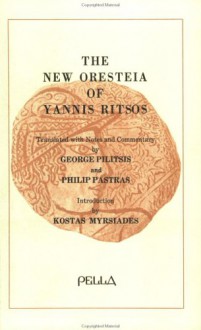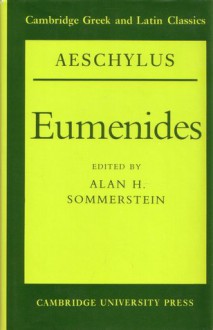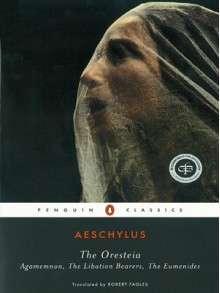
I have seem some recent adaptations of Greek myths in the cinemas of late and to say that they were rubbish was an absolute understatement. Mind you, that is Hollywood and Satre is anything but, and when I discovered that the last play in the book that I had picked up at a second-hand bookshop was based on the myth of Orestes my immediate thought was 'this is going to be good'. As it turned out it was good – really, really good. In fact I would love to see it performed. Actually I would so love to see it performed that I want to join an amateur theatre company and force them to stage it (though I know for a fact that that is not going to happen – having a full time job makes it really difficult to become involved in the arts, unless of course you devote your entire time to the project, which I simply cannot do).
The problem with writing a review of this play, in the way that I write reviews, is that I cannot do it without actually spoiling the play, especially since there is one enormous twist in it that reveals what is actually going on – and it all has to do with the flies. So, I will try to say as much as possible about the play without revealing the twist, and when I do I will put up a spoiler alert. Anyway, like the said Hollywood movies, what is happening is that Satre is putting his own interpretation on the myth, however unlike the aforementioned movies he does a much better job at it. The major themes with the modern interpretation of the ancient Greek myths is the rejection of the supernatural.
The thing with our modern interpretation is that we see these myths as a story of how humanity rejects the gods and takes control of their own lives. Unfortunately Hollywood simply dresses it up with great special effects and huge battles, and then finishes off by saying that humanity no longer has any need for the gods so bugger off and leave us alone. What Satre does is that he goes much deeper into it explaining why humanity, as represented by Orestes, has rejected the gods, and it all has to do with free will. Zeus gave Orestes free will to obey him, and Orestes uses that free will to reject Zeus (which is an interesting analogy to Christianity). However, as I will explain, while Orestes takes on a figure of Christ, this play isn't a Christian allegory (Satre was an atheist), but rather uses the play to create a new interpretation of Christ.
So, first, I should mention the background, though those who have been following my reviews probably already know the story of how when Agamemnon returned from Troy he discovered that his wife Clytemnestra was having an affair with Aegisthus, and they both murder him and Aegisthus takes the throne. Orestes flees as he is the heir to the throne, and for Aegisthus to become king he needs to get rid of the heir apparent. Anyway, the city becomes infested with flies, and these flies remain for over fifteen years. Aegisthus knows what these flies are about, however nobody else does. In a way they are the result of Aegisthus' sin – the murder of the true king, and his adulterous affair with Clytemnestra. The city of Argos, through their acts, has become tainted. However, it goes much further than that, which I have decided that I won't actually reveal.
Anyway, along comes Orestes, and the first part of the play, much like the Ancient Greek versions, has Orestes trying to find out who he can trust and who he can't. He approaches Electra and spends time testing her to see if she will support him or betray him. However, as it turns out it isn't Electra who betrays him, but Zeus. Yet despite Zeus' warning of his impending doom, Aegisthus chooses to do nothing – his crime, his guilt, and his sin has so worn him out that he simply has no desire to hold onto the throne anymore. In a way his claim to the throne is a Phyric victory – sure, he is king, but the guilt that has come upon him has so worn him down that it no longer seems worth it.
It is interesting that we see similar themes pop up in other plays – Hamlet has the usurper who kills the king and marries the queen, while Macbeth as the usurper whose guilt so wears him out that he simply become too exhausted to continue (though he does fight until the bitter end). Yet Shakespeare had a purpose in writing against usurpers, but I'm not entirely sure if Satre was writing in a similar vein – the play was published during World War II while France was occupied by the Nazis. In a way this could almost be a subtle dig at the Vichy government who, after capitulating to the Germans, pretty much became collaborators.
Yet there is also this idea of somebody coming along and taking away a nation's sin. At the end of the play Orestes rejects Zeus, claiming that because he has free will, he has the free will to reject Zeus and go his own way. However, he also acknowledges his crime (killing his mother) – something that Aegisthus (and the city) refused to do. In a way Aegisthus believed that he was in the right, and the fact that the city did not rise up against Aegisthus because he had a hand in murdering Agamemnon, were cursed to be tormented by the flies. However Orestes, while avenging the death of his father, takes ownership of his crime, and leaves the city, and takes the flies with him – in a way a form of Christ figure.
Yet it is interesting how, when he kills his mother, the city rises up against him in revolt – sure, they did nothing when Agamemnon was murdered, but then again he had been away for ten years, and ten years is an awful long time – long enough for the population to become accepting of a new king. Yet Orestes does not take the title – well he does, but he takes the title of a king without a country. In the original version he is driven out of Argos and flees to Athens when he faces trial, and is acquitted, for his crime. No such thing happens here, but he accepts his crime, and he accepts his punishment, and in doing so redeems the city from the curse of the flies.
Yes, Orestes sounds as if he is some sort of Christ figure, and in a way he is, yet there is a twist – Christ came as God in the flesh, while Orestes, through his free will, rejects Zeus. In a way what Orestes is doing is giving the people of Argos their freedom. He takes ownership of the crime and frees them from the curse of the flies, but in rejecting Zeus he shows them that they do not need to be beholden to the gods, but they have their own free will to make their own decisions and decide their own destiny. However, for the people to realise that, they needed a Christ figure to come along and show them – the problem is that people don't actually want to do that, they want to be led, which is why people like Jim Jones are always able to attract so many followers.
1 September 2016 - Paris

 Log in with Facebook
Log in with Facebook 





 The second part of Aeschylus's Oresteia trilogy in a new version by Ed Hime.
The second part of Aeschylus's Oresteia trilogy in a new version by Ed Hime. 





